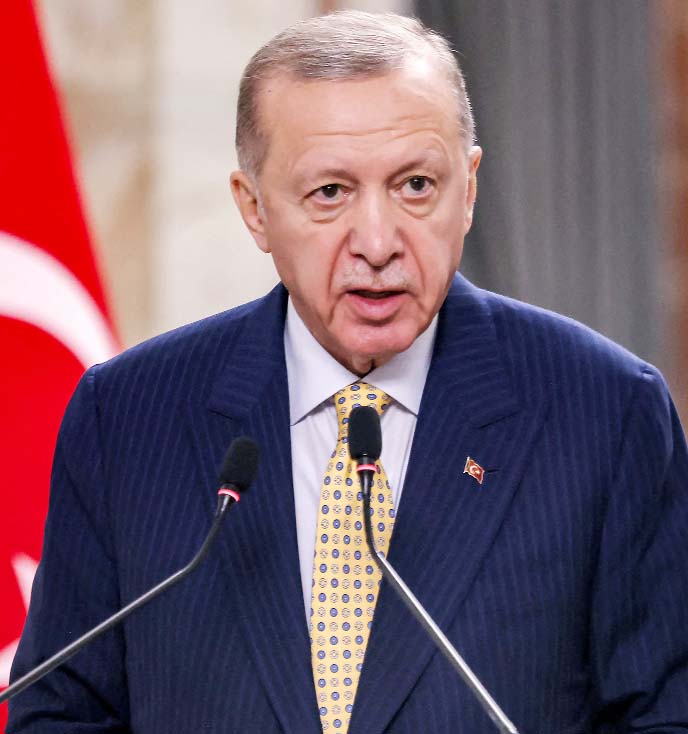Is Erdogan taking an even more authoritarian turn?

Deutsche Welle :
The arrest and removal from office of Istanbul mayor Ekrem Imamoglu last week has caused consternation in Turkey. Tens of thousands of people have been taking to the streets on a daily basis to protest against Turkish President Recep Tayyip Erdogan.
There has also been international criticism of the arrest of Imamoglu, a long-time political rival of Erdogan’s, and the increased repression against the Turkish opposition and independent media
The European Commission on Monday called on Turkey to “uphold democratic values” and the German Foreign Ministry said that political contests “must not be conducted through the courts and prisons.”
Experts say Turkey has been on the path towards autocracy for some time now. Since surviving an attempted coup in 2016, Erdogan has expanded his presidential powers and cracked down on opposition and political dissent.
Erdogan was born in 1954. His father was a coast guard and the family lived in Istanbul’s working-class and socially conservative neighbourhood of Kasimpasa.
He attended a religious vocational high school and soon made a name for himself as someone with a gift for public speaking.
The President himself has said that he graduated from Istanbul’s Marmara University in 1981 but according to the university’s website it only acquired its university status in July 1982.
So there has been some debate as to whether Erdogan actually has a university degree. This is, in theory, a prerequisite for the office he currently holds.
Erdogan worked for the local transport authority and played semi-professional football. In 1978, he married Emine Gulbaran; they have four children.
Erdogan’s political career began in the 1970s when he joined a religious and conservative party led by politician Necmettin Erbakan.
In 1994, he was, to the surprise of many, elected mayor of Istanbul, although he was not really well known in local politics. In 1998, he had to resign the post after being sentenced to prison for reading a nationalist poem in public that was seen as incitement to religious hatred.
After his release, Erdogan and other politicians founded the conservative and right-wing populist Justice and Development Party (AKP) in 2001. Just one year later, the party garnered 35% of votes in a general election and won by a landslide. Although Erdogan was initially unable to serve as prime minister due to his conviction, in 2003 he was appointed to this office after a change in the law.
During his three terms as prime minister, Erdogan managed to boost economic growth and was even praised internationally as a reformer.
Accession negotiations with the EU officially began in 2005 and the process led to Turkey modernizing laws and regulations at an unprecedented pace. Erdogan pushed ahead with the development of infrastructure and the Turkish middle class got bigger.
The 2013 Gezi Park protests in Istanbul marked a turning point. Although they started as a small demonstration against an urban development project for the park, they soon became a wider movement against Erdogan’s authoritarian policies and the increasing restrictions on freedom of expression.
The government reacted with a heavy hand, using tear gas, water cannons and rubber bullets. Eight people died and thousands were injured. Erdogan described the protests as an “attempted coup” and used them to further consolidate his power.
Erdogan has been president of Turkey since 2014 and ever since then he has continued to expand his powers. In 2018, he was given far-reaching powers when the current presidential system was introduced. It abolished the office of prime minister, making the president, who previously had had a more symbolic role, the head of the executive.
Another step was the drastic restriction of press freedom. Numerous independent media outlets were shut down or placed under state control, making it increasingly difficult to criticize Erdogan and his entourage. Journalists who do dare to criticize the government are often intimidated or even imprisoned. At least nine reporters covering the current protests about Imamoglu have been arrested already.
In the past decade, there has also been an increase in arrests of opposition politicians. After the failed coup attempt of 2016, thousands of political opponents and academics were arrested and accused of supporting terrorist organizations.
On the night of July 15 to 16, 2016, parts of the Turkish military allegedly attempted to overthrow the Erdogan-led government.
The government mostly blamed Fethullah Gulen, a reclusive US-based cleric, who has since died in exile, and his followers. The allegations have never been proven. Since then thousands of civil servants, judges and public prosecutors were dismissed.
It is still unclear how the imprisonment of Istanbul’s mayor will affect Erdogan in the long term. Turkey analyst Hürcan Asli Aksoy at the Berlin-based German Institute for International and Security Affairs says this is the “million-dollar question.”
